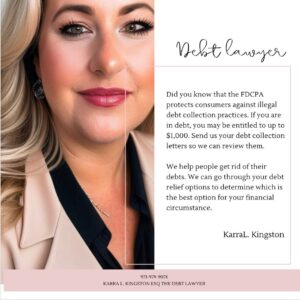Debt collection can be a stressful and overwhelming experience, especially if you are being harassed by a debt collector. However, it’s important to remember that you have legal rights under the Fair Debt Collection Practices Act (FDCPA) that can protect you from abusive or harassing debt collection practices. Here are some steps you can take if a debt collector is harassing you:
Understand Your Rights
 The FDCPA outlines specific rules that debt collectors must follow when attempting to collect a debt. For example, debt collectors are not allowed to call you before 8:00 a.m. or after 9:00 p.m. unless you agree to it. They are also not allowed to use threats, intimidation, or harassment to collect a debt. Make sure you understand your rights under the FDCPA so you can recognize when a debt collector is engaging in illegal behavior.
The FDCPA outlines specific rules that debt collectors must follow when attempting to collect a debt. For example, debt collectors are not allowed to call you before 8:00 a.m. or after 9:00 p.m. unless you agree to it. They are also not allowed to use threats, intimidation, or harassment to collect a debt. Make sure you understand your rights under the FDCPA so you can recognize when a debt collector is engaging in illegal behavior.
Keep a Record of Communications
If a debt collector is harassing you, it’s important to keep a record of all communications. This includes phone calls, letters, and emails. Be sure to document the date and time of each communication, as well as the name of the debt collector and a summary of the conversation. This can be helpful if you decide to take legal action against the debt collector.
Request That the Debt Collector Stop Contacting You
Under the FDCPA, you have the right to request that a debt collector stop contacting you. You can do this by sending a letter to the debt collector requesting that they stop all communication with you. Once the debt collector receives your request, they are only allowed to contact you to confirm that they received your request or to inform you of legal action they plan to take against you.
- Contact an Attorney
If a debt collector is harassing you despite your efforts to stop them, it may be time to contact an attorney. An experienced debt collection defense attorney can help you understand your legal options and can take legal action against the debt collector on your behalf.
File a Complaint with the Consumer Financial Protection Bureau
You can also file a complaint with the Consumer Financial Protection Bureau (CFPB) if you believe that a debt collector is engaging in illegal or harassing behavior. The CFPB will investigate the complaint and may take legal action against the debt collector if they find evidence of wrongdoing.
In conclusion, if a debt collector is harassing you, it’s important to understand your legal rights and take action to protect yourself. Keep a record of all communications, request that the debt collector stop contacting you, contact an attorney if necessary, and consider filing a complaint with the CFPB. Remember, you have the right to be treated fairly and respectfully by debt collectors.
Karra Kingston is a dedicated bankruptcy lawyer who has helped many people fight against creditors and their abusive debt collection practices. Under the Fair Debt Collection Practices Act (FDCPA), consumers have certain rights when it comes to debt collection, and it’s important to have an experienced attorney like Karra Kingston on your side to protect those rights.
One of the key benefits of working with an attorney like Karra Kingston is that they can help you understand your legal rights and options when it comes to debt collection. They can review your case for free and determine whether the debt collector has violated any provisions of the FDCPA. If they find evidence of illegal or abusive behavior, they can take legal action against the debt collector on your behalf.
Some common examples of illegal debt collection practices include:
- Calling you outside of reasonable hours (before 8 a.m. or after 9 p.m. in your time zone)
- Threatening you with arrest, imprisonment, or other legal action they cannot take
- Using obscene or profane language when communicating with you
- Falsely claiming to be attorneys or government representatives
- Adding unauthorized fees or charges to your debt
If you’re being harassed by a debt collector, it’s important to take action to protect your rights. An experienced attorney like Karra Kingston can help you understand your options and take legal action against the debt collector if necessary. Don’t let debt collectors intimidate or harass you – contact a bankruptcy lawyer like Karra Kingston today to get the help you need.